
Top 35 Marketing KPIs That You Should be Tracking in 2022
In this article, we’ve gathered the top 35 marketing KPIs that everyone should track in order to understand and analyze the results of their marketing campaigns.
Executive Summary:
In this article, we’ve gathered the top 35 marketing KPIs that everyone should track in order to understand and analyze the results of their marketing campaigns.
Simply running marketing campaigns isn’t enough. To understand the impact of your efforts and drive marketing growth, you need to dig deeper. Are you confident that you’re measuring the right metrics to gauge your marketing success?
While most marketers focus on popular KPIs like cost per lead and conversion rate, there’s a wealth of other key performance indicators that can provide critical insights into your marketing strategy. Tracking these essential metrics not only helps you optimize your campaigns but also ensures that every marketing dollar spent is contributing to your bottom line.
Let’s dive into the top 35 marketing KPIs that can transform your approach. From understanding sales growth to measuring content effectiveness, we’ll cover the must-track KPIs that can elevate your marketing game and drive real results.
Top 35 Marketing KPIs That You Should be Tracking in 2022
In this article, we’ve gathered the top 35 marketing KPIs that everyone should track in order to understand and analyze the results of their marketing campaigns.
High-Level Business KPIs
1. Sales/Leads:
The number and quality of leads generated by your marketing campaigns. More leads mean more sales opportunities. Focus on both the quantity and quality to maximize conversion potential.
For example, if your business produces SaaS and offers new customers a free trial, then the number of prospects that see or click on your lead magnet will be the number of overall leads that you have generated, while the number of quality leads is the number of prospects that are likely to become paying customers. Or, in this example, the lead quality could be measured by how many people have signed up for trial.
2. Return on Investment (ROI)
ROI measures the profit gained from marketing investments relative to their cost. It helps justify marketing expenditures and guides future budget allocations.
3. Lifetime Value of a Customer (LTV)
How much is each customer worth to your business? LTV calculates the total revenue expected from a customer over their lifetime. It helps determine how much to invest in acquiring and retaining customers.
4. Customer Acquisition Cost (CAC)
CAC is the total cost of acquiring a new customer, including marketing and sales expenses. Comparing CAC with LTV reveals the efficiency of your customer acquisition efforts.
5. Conversion Rate
This KPI measures the percentage of users who complete a desired action, like filling out a form or making a purchase. It indicates the effectiveness of your marketing tactics in driving user actions.
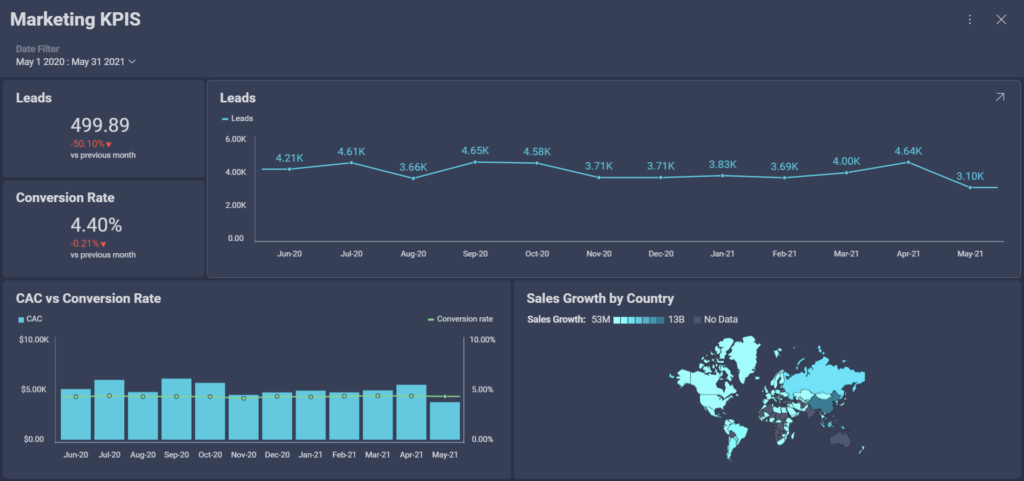
6. Sales Growth
Sales growth measures the increase in revenue over a specific period. It’s a fundamental KPI that shows the effectiveness of your marketing efforts in driving revenue and business expansion.
PPC KPIs
Tracking PPC performance is crucial to understanding the effectiveness of your paid advertising campaigns. Monitor these key PPC metrics to optimize your ad spend and performance:
7. Return on Ad Spend (ROAS)
ROAS measures the revenue generated for every dollar spent on advertising. It indicates the effectiveness of your PPC campaign and whether it’s delivering a profitable return. Higher ROAS means better performance and more efficient use of your ad budget.
8. Cost per Click (CPC)
CPC reflects the actual price paid for each click on your ads. CPC can vary by industry and keyword, so understanding your expected costs before launching a PPC campaign helps in budget planning. For example, in 2019, the global average CPC was $2.69 for search ads and $0.63 for display ads.
9. Click-Through Rate (CTR)
CTR measures the percentage of users who click on your ads compared to the number of times they’re shown. A higher CTR indicates effective ad messaging and an optimized user journey from ad to landing page. Aim for a CTR that exceeds industry benchmarks to ensure your ads are engaging.
10. Quality Score
Quality Score, provided by Google Ads, assesses the relevance and quality of your ads, keywords, and landing pages. A higher Quality Score can lead to lower costs and better ad positions. Improve your Quality Score by ensuring your ads are relevant to your keywords, optimizing your landing page for alignment with your ad copy, and enhancing your CTA.
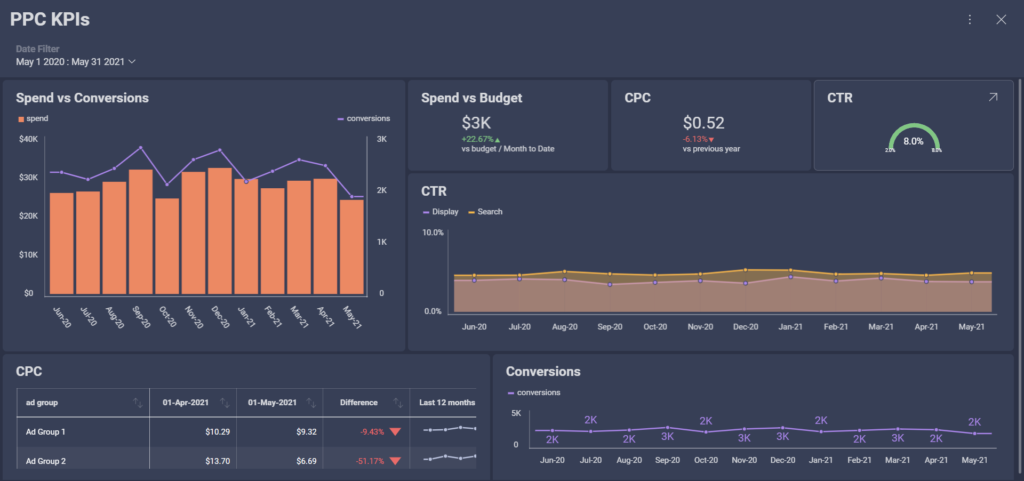
SEO/Content Marketing KPIs
Content marketing involves creating and sharing valuable content like blog posts, e-books, and infographics to attract and engage your target audience. It helps in building brand awareness, generating leads, and increasing online sales. Struggling to measure your content’s impact? Track these top content marketing KPIs:
11. Organic Sessions
The number of unique visits to your content. High traffic indicates that your content is attracting an audience, but it’s only the beginning.
12. Keyword Ranking
Measures how well your content ranks for targeted keywords in search engine results. Higher rankings lead to increased visibility and traffic.
13. Time on Page
The average amount of time visitors spend on a page. It reveals how engaging and valuable your content is to readers.
14. CTR
Measure the effectiveness of your content by tracking how often users engage with it through clicks in organic search results.
15. Bounce Rate
The percentage of visitors who leave your site after viewing only one page. A high bounce rate can indicate issues with content relevance or user experience.
16. Social Shares
The more social shares you receive, the broader your reach. Making your content easily shareable across different social media channels is essential. A few social shares can lead to viral growth, driving new leads to your website and increasing your social media following.
17. Comments
Comments on your web pages indicate engagement and can spark conversations about your content. They provide feedback, which can be valuable for improving your content and marketing strategies. Always respond to comments, including critical ones, to maintain a positive brand reputation and show that you value your audience’s input.
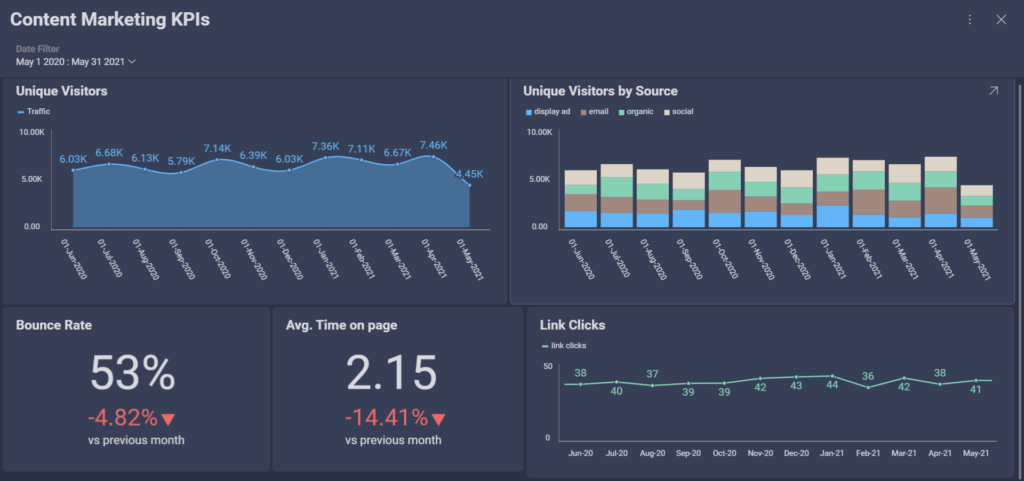
Ready to See Your Own SEO Data with Our SEO management template
We’ve developed a SEO management template designed to help you and your team manage SEO campaigns effectively, from initiation to completion. This template includes ready-to-use dashboards that visualize your metrics in real time. Best of all, you don’t need any BI knowledge to get started.
Here’s how to set up your dashboards:
- Use the Template: Start by downloading and opening the SEO management template.
- Connect Your GA4 Accounts/Google Search Console: Link your Google Search Console and Google Analytics 4 accounts to the template. You can easily copy the dashboard and use it with different GA4 accounts or properties as needed.
- See Your Data Populating in Seconds: Watch as your data automatically populates the dashboards, giving you instant insights.
You can also add filters to your dashboards to focus on the performance of individual landing pages or groups of pages (e.g., blog, category).
Social Media Marketing KPIs
In the digital age, social media is a vital channel for reaching your audience. To ensure your social media strategy is effective, track these essential KPIs:
18. Click-Through Rate (CTR)
The CTR measures the percentage of users who click on your social media posts or ads. A higher CTR indicates that your content is compelling and relevant to your audience. Aim to optimize your content and call-to-actions to boost CTR and drive more traffic to your desired destination.
19. Engagement (likes + comments + shares)
Engagement measures the likes, comments, and shares your posts receive. It’s a critical KPI for social media success because platforms often promote posts with higher engagement. Aim for high engagement rates to improve visibility and reach.
20. Reach
Reach represents the total number of unique accounts that have seen your posts. While broader reach helps with brand awareness, it’s crucial to also focus on engagement to make sure your posts resonate with your audience.
21. Impressions
Impressions track the number of times your post appears in users’ feeds. Although impressions don’t guarantee that users have interacted with your content, they indicate the potential visibility of your posts.
22. Mentions
Mentions or tags of your brand show that people are talking about you, which increases brand awareness. Positive mentions act as free endorsements of your product or service, enhancing your brand’s reputation.
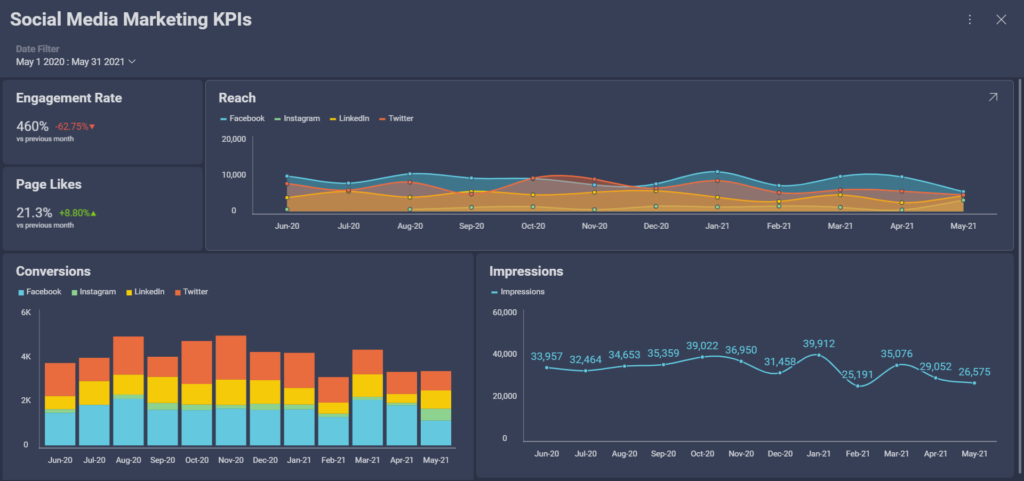
Email Marketing KPIs
23. Open Rate
The percentage of recipients who open your emails. It reflects the effectiveness of your subject lines and sender reputation.
24. Click-Through-Rate
The percentage of email recipients who click on a link within your email. It measures how compelling your email content is and its ability to drive actions.
25. Click-to-Open Rate
The percentage of email openers who click on a link within the email. It assesses how well your email content engages recipients who have already shown interest.
26. Unsubscribe Rate
The percentage of recipients who opt out of receiving future emails. High unsubscribe rates may indicate issues with content relevance or frequency.
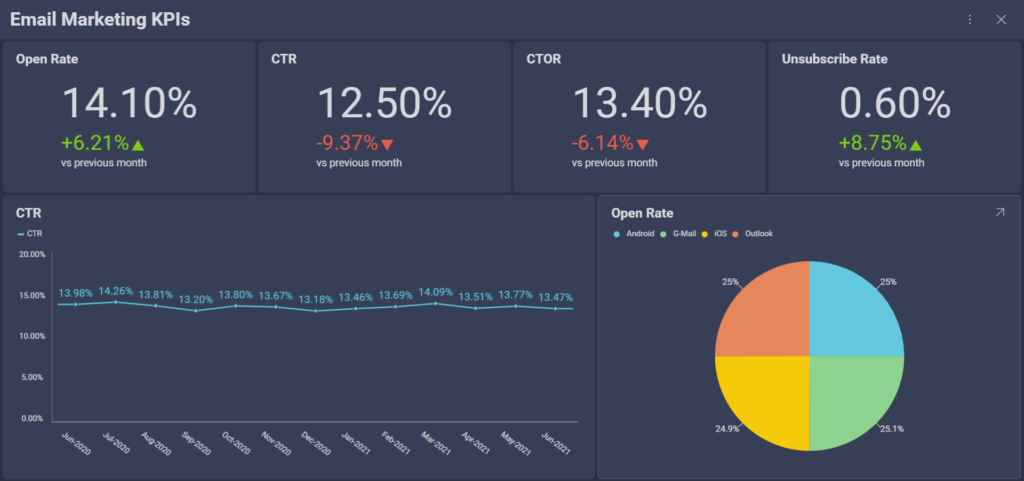
Product Marketing KPIs
Product marketing focuses on launching and promoting products effectively. To gauge your success, track these key product marketing KPIs:
27. Trial and Demo Signups
Tracking trial and demo signups helps you assess the effectiveness of your marketing messages and content. If signups are low, consider refining your marketing strategies and optimizing your sign-up page.
28. Product Usage
Product usage metrics reveal how often and in what ways consumers use your product. Understanding usage patterns helps improve retention rates and identify upsell or cross-sell opportunities.
29. Net Promoter Score (NPS)
NPS measures how likely customers are to recommend your product. A high score indicates satisfied customers who can bring in new leads. Use feedback to enhance your product and customer experience.
30. Feature Engagement and Adoption
Monitor how users engage with different features of your product. This insight guides your product development and helps you understand what aspects your customers value most.
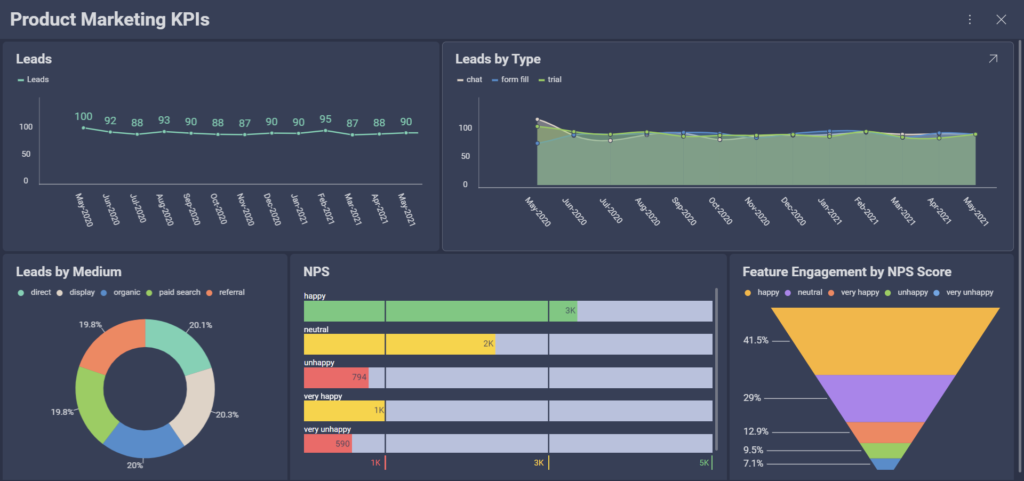
B2B Marketing KPIs
B2B marketing requires careful tracking to optimize lead generation and conversion. Focus on these KPIs to evaluate and improve your strategy:
31. Cost per Lead
This KPI measures the expense of acquiring each lead. Tracking cost per lead across channels helps assess the efficiency of your marketing efforts and optimize your budget allocation.
32. Landing Page Conversion Rate
The conversion rate of landing pages indicates how well they compel visitors to take action. A low conversion rate suggests the need for improvements in content, design, and call-to-action elements.
33. Sales Pipeline Velocity
Sales pipeline velocity measures how quickly leads move through your pipeline and the value they bring. Faster velocity means quicker revenue generation and more efficient sales processes.
34. Sales Close Rate
This KPI assesses how effectively salespeople close deals by comparing closed deals to lead opportunities. It helps evaluate sales performance and effectiveness.
35. Customer Satisfaction
Customer satisfaction reflects how content your customers are with your services. High satisfaction scores are crucial for retaining customers and ensuring overall business growth. Measure this through surveys and feedback.
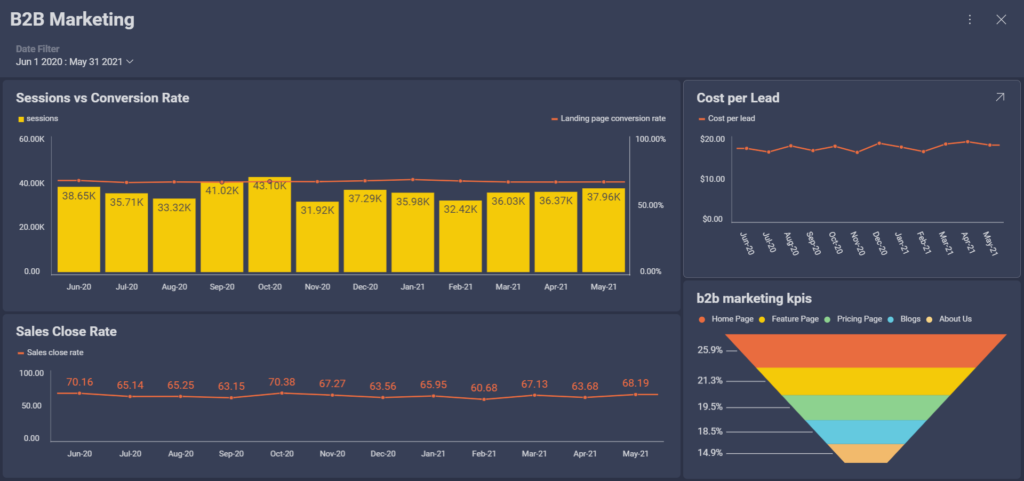
Wrapping It Up…
The overall goal of marketing is to acquire customers and increase the business’s revenue. Armed with these metrics, you’ll be able to validate everything you do as a marketer, every single campaign with which you deliver qualified leads to sales.
Need help?
Slingshot streamlines your marketing processes and brings together all the data insights and tools that your team needs to unlock its full marketing potential. We integrate directly with Marketo, HubSpot, Google Analytics, and other leading analysis tools to assess past wins and grow KPIs with each campaign. Turn analysis into action in seconds by creating discussions and tasks right from annotated dashboards. Give it a try!
Related Articles
Ready to grow your business 10x with AI decision-making?
Request a Free Demo of SlingshotSHARE THIS POST




 Return to Blog
Return to Blog


